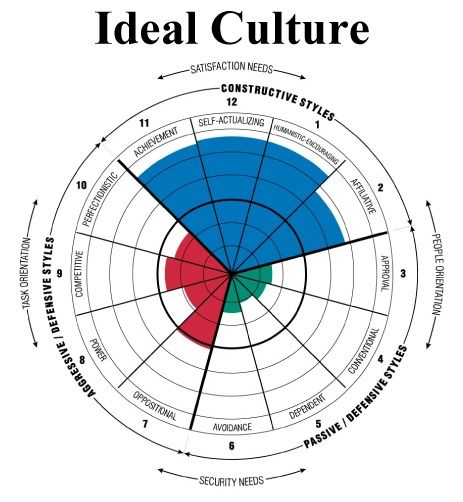Reinvention: Islands of Excellence In A Sea of Mediocrity
“one cannot manage change. One can only be ahead of it.”
Peter Drucker
The Cornerstone Assumption of the funeral side of DeathCare is that being nice is the same as being effective. Our “worldview” of being nice people is that we must never, ever make waves or create awkwardness. We run pell-mell from any form of confrontation. This is an inherently flawed “worldview” but it is, nevertheless, the one that prevails and pervades the profession of funeral directing.
There is a consequence to this worldview. In fact, two come to mind. First,we rarely, if ever, stand up for ourselves.
But the second and more dangerous of the two is our overwhelming tolerance of mediocrity. Our almost pathological preference for conflict-avoidance leads to almost universal passive aggressive cultures in which:
“More energy is put into thwarting things than accomplishing things…but in the nicest way”
I am unwilling to believe that people don’t know this.
In fact, I believe that most practitioners are very much aware of it but since no one ever calls anyone to account and very, very few firms actually hold themselves and their staffs to high standards there is a mutual secret of complacency.
Whoa…Wait A Darn Minute…Alan!!! WE HAVE HIGH STANDARDS…YOU NEED TO COME SEE OUR FUNERAL HOME!!!!
Sorry, I have seen it and, frankly, the Emperor has no clothes.
In his book “The Five Dysfunctions of a Team” Patrick Lencioni discusses “Artificial Harmony” where fear of conflict leads to behaviors that mask true issues and avoid accountability. You are confusing Artificial Harmony with “fire-in-the-gut” passion for doing what is best for your customers. I know this because you are choosing to lay down and let your customers run over you when you know better.
But you are right. Before I go further we do need to stop here and draw a line. First, all human organizations are, to one extent or another, dysfunctional. This does not mean they are bad. Nor does it mean they are not occasionally effective. But it almost always means they are not optimal. Unfortunately, in DeathCare, it too often means they are mediocre even when they think they hung the moon. In fact, there is a correlation between “moon-hanging” and secret mediocrity. There is only one road to health and that is recognizing and accepting that there is a necessary tension between your current norms and the ideal you are hopefully working toward. Improvement requires you embrace that tension…something most DeathCare practitioners are loathe to do.
How do I know?
There are several ways, some subjective others scientific.
- SUBJECTIVE OBSERVATION: I have a very close acquaintance. She is very likely a genius. She is also mentally ill. Early in her career she had a byline with either Time or Newsweek (I can never remember which) and The Journal of Commerce. This was a remarkable accomplishment for a woman in her 30’s in the 1960’s and 70’s. She is now and has been for many years unable to work. If I did not know her well, however, it would be almost impossible for me to detect that her take on reality was not true. I once asked a psychiatrist friend how he could possibly diagnose such a case. He told me that it was impossible in the first visit and often for the first 3 or 4 visits. But, ultimately, the patient can’t keep their story straight. Cracks appear and then you begin to see the real truth. And so it is with a human organization. Observe long enough and the cracks appear in the veneer. Not long ago I did a project for a very progressive and impressive firm. This firm “had it together”. While there I observed an incident. I concluded it was an aberration in the culture. Recently, I had occasion to interact with the same firm. During that interaction I observed a different incident with a different employee resulting in the same aberrant behavior. The cracks appear. No one is perfect. Artificial Harmony.
- SCIENTIFIC ASSESSMENT: I use an assessment tool called an Organizational Culture Inventory (OCI). REMEMBER, I prefer to teach people to fish. That means that I want you to be well so you can function independent of me in the future. This tool has been used for decades to assess all manner of organizations across virtually every culture in the world. The research company that developed it (Human Synergistics) has found that cultures that produce optimal performance (Ideal Cultures) vary from country to country. The assessment produces a visual diagram of organizational culture called a circumplex. By comparing your company’s circumplex with the ideal you can focus in on what you need to do to improve your culture from its current norms to the ideal norms. It gets everyone pulling in one direction. Very effective and fairly rapid. Here is the ideal culture for the United States.

As a simplistic overview the Circumplex is divided into three parts: Constructive, Passive-Defensive and Aggressived Defensive. Ideal Cultures…those that produce optimal results…are almost always constructive styles. Here is a composite of actual funeral home norms:
Obviously quite a difference. What I want you to notice is that the strongest parameter, which is in green (part of the passive defensive culture) is avoidance. Here is a direct quote on that behavior at the individual level:
“The Avoidance style reflects apprehension, a strong need for self-protection, and a propensity to withdraw from threatening situations. People high in this style “play it safe” and minimize risks, shy away from group activities and conversations, and react to situations in an indecisive and non-committal way.”
Be careful here. You may think this is not you. But this circumplex included some very highly respected firms. Can you begin to see why I believe we have such a high tolerance for mediocrity?
3. THE NAKED TRUTH: I have a hypothesis I have been trying out lately. So far I am hitting 100%. I don’t like it. You won’t either. But if we are going to get well it needs to be said. Here is what I think happens. You get out of mortuary school. You go to work at a funeral home. Maybe your own family funeral home. You do removals, you embalm, you oversee visitations, you drive family cars, you lead processions and then one day…out of the blue…the funeral home is real busy that day…you are minding your own business and they get one…more…call. Someone hands you a folder, tells you the family will be here to make arrangements at 2:00 and you need to make arrangements…by yourself…unsupervised. When I first posed that hypothesis I was not expecting the response I got. Many of you can still name the family after 20 and 30 years. Some remember you were told not to worry “it’s only a cremation family”. Others remember the day of the week. But, so far no one has suggested it was different. THAT SEEMS TO BE THE SUM TOTAL OF YOUR ARRANGEMENTS TRAINING. If this is true then it explains the inability of the profession to defend itself. It explains the low self image that characterizes us. It explains our codependency relationship with our casket companies. It explains a lot. Best of all it can be fixed!!! and fast. And it gives me hope.
THE GREAT TEASE
I really try to keep these under 700 words I am almost double that on this one. Here is what I want to tell you. I have found the Islands of Excellence in our Sea of Mediocrity…the real answers. Thanks to the recent research completed by the Funeral Service Foundation we now have a much better sense of what consumers are looking for. I have found solutions for the Arrangement Conference. I have found the mechanisms that will permanently transform you and your culture into a high performing culture.
Next week I will share a little of that with you and my plans to help those who are willing to rediscover some of that “fire-in-the-belly” passion. Let me leave you with this:
I continue to believe we stand at the threshold of the single biggest opportunity in the history of DeathCare. The transformation will not be painless but the pain will be tolerable. It will require investment but that investment will not be out of the reach of even the most humble willing to make it. Best of all many of you will rediscover your purpose. The only real barrier will be our attitude.






